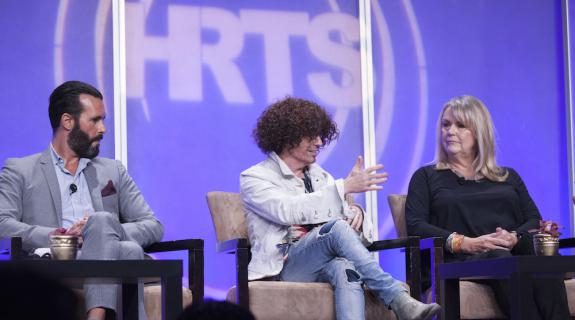[Pictured at top, left to right: Charlie Corwin, Mike Darnell, Trish Kinane]
It is an interesting moment for unscripted programming. American Idol is no longer with us (for now), but other old standbys seem to be holding up okay. At the same time, the sheer quantity of available non-scripted programming is, in a sense, at unprecedented levels thanks to the internet.
“User-generated content is largely unscripted,” said Charlie Corwin, Co-Chairman of Endemol Shine Americas and Co-CEO of Endemol Shine North America. “It’s the most created and most viewed kind of programming.”
Where do unscripted television shows fit into this mad era of content creation and consumption, where anyone with a smart phone can broadcast themselves to the world and anyone else with a smartphone can watch?
Chatting on a Hollywood Radio and Television Society “State of the Industry” panel on Tuesday, Corwin said he thought all the new platforms for video entertainment will be good for television, because “you’re going to see new voices reach new audiences and the industry will benefit from that.”
But, he added, in this era of binge-watching and cord-cutting and other alternative viewing options, “we do need to figure out how this programming lives on SVOD.”
The HRTS panel, which included legendary unscripted titans such as hit-maker Mike Darnell, president of unscripted and alternative TV at Warner Brothers, seemed generally optimistic about reality television’s role in a changing media landscape. Paul Telegdy, president of alternative and late-night programming at NBC Entertainment, pointed to the internet’s power to amplify traditional broadcast. For instance, NBC’s new comedy-variety series Little Big Shots stems from a former Ellen segment, where the clips with kids showing off their performance chops would sometimes get millions of views online. Now, with the full-on series firmly established, some of those same clips have received “tens of millions of views after we did broadcast,” Telegdy said.
“The ecology is always swinging one way or the other,” Telegdy continued. But currently, as evidenced by the recent upfronts, broadcast is still “very attractive to advertisers… because it is a place where people do, whether by accident or otherwise, watch commercials… There’s still a ton of money in broadcast when you hit and hit it right.”
Hitting it right, he explained, is a combination of “competitive production costs and scalability.”
Reality titans such as The Bachelor/Bachelorette, Survivor and The Voice show that “classic original formats, the ones that are simple and the first in the field” never really “go away forever,” said Trish Kinana, president of entertainment programming at FremantleMedia North America. And “if you get a format right and sell it internationally, you get a long tail of income for years with very little effort.”
Of course, getting that format right is the rub in today’s oversaturated climate, where the old guard of reality leave little shelf space in broadcast for new shows, and what shelf space there is gets faced with an easily distracted viewership. Unscripted became so massively popular in the early 2000s it almost became a “victim of its own success,” Corwin said. “Some of these shows have lasted so long, they’re almost like sporting events.”
One of Endemol’s core strategies for landing on the small remaining shelf, he continued, is to “take formats successful in other countries around the world” and package them for the states. Ultimately, he continued, “the role of broadcast networks” today “is to create programming you can watch with your whole family… you have to have a very specific development prism on broadcast.”
The days of reality shows pulling ratings on shock value alone are behind us, a trend crushed first by cable and then the internet.
“People are immune to being shocked anymore,” said Darnell, who has launched infamous projects such as When Animals Attack and Temptation Island. “People [these days] respond to cleverness, humor and authenticity… I used to think controversy was enough to get a show launched, but it needs to be inside the show. Outside controversy in general won’t draw people in to watch. It has to be organic.”
Tags:













































__twocolumncontent.jpg)











